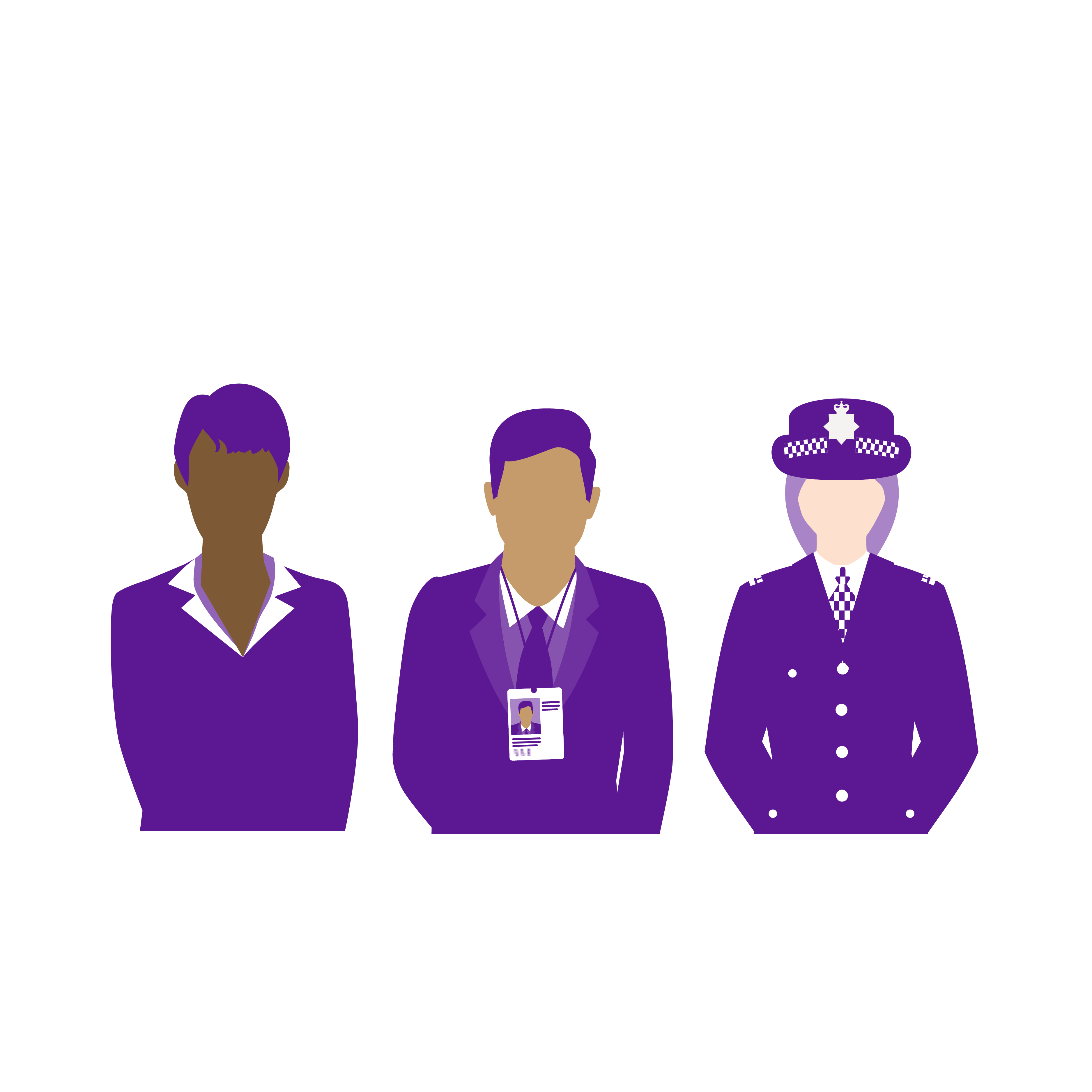Transforming our service to victims at the CPS

Foreword
Being a victim of crime can be deeply traumatic, and for those who find themselves in the criminal justice system the process can feel overwhelming, unfamiliar, and incredibly challenging. We do not underestimate the intense difficulty of navigating this system, or the resilience required to do so. We also know that the way in which we communicate with victims has fallen short of what they need, and rightly expect: it does not currently reflect our aim of supporting victims through the process and minimising further trauma. We are deeply committed to changing that – and to transforming the service we provide to every victim.
Our duty is to prosecute the right person for the right offence, and to bring offenders to justice where possible. We must always be fair, objective, and impartial – balancing the rights of both victims and suspects. This means engaging with victims respectfully and recognising that the circumstances of every case are different, and so are the needs of every victim. When we are getting this right, victims should feel informed, empowered and – regardless of the final case outcome – that they have been treated fairly.
This is a significant, long-term programme of work. It is vital that any changes we make are firmly rooted in strong evidence – and so we have commissioned independent research to help us understand exactly what victims need from us. This comprehensive victims’ needs assessment is the first we have undertaken, and it will enable us to play our part in improving victims’ experience across the entire criminal justice system. The Government recently published a draft Victims’ Bill, alongside a wider package of proposed measures to drive improvement in this area. This new legislation builds on existing obligations set out in the Victims’ Code of Practice, and strengthens what victims can expect from criminal justice agencies. Our independent research will support us as we play our vital role in delivering this work.
These findings have been shaped and informed by experts in the field: those who work to support victims, practitioners from across the criminal justice system, and – crucially – victims themselves. I am very grateful to all those who have given their time, expertise, and insight throughout this process – and I am particularly grateful to the victims who have been generous enough to share their experiences.
This report summarises the findings of the independent research, and outlines how we will take forward the recommendations to:
- Improve the quality of communication for all victims, working with criminal justice partners to develop a new model
- Enhance the service provided to those victims with the greatest needs
- Innovate and pilot new ways to strengthen our engagement with victims
- Build an organisational and leadership culture that prioritises engagement with victims
These recommendations provide us with a clear direction as we move forward with our wide-ranging improvement work – but this is not the end of the conversation. We will continue to work closely with our criminal justice partners, stakeholders, the third sector and victims to shape an excellent service in the months and years to come.
Max Hill QC, Director of Public Prosecutions


Commissioning independent research
The CPS has long recognised the need to focus on our communications with victims. We were deeply concerned when our independent inspectorate – Her Majesty’s Crown Prosecution Service Inspectorate (HMCPSI) – found in 2018 that our letters to victims regularly fall short of the high standard that victims deserve. While we accepted all the recommendations made by HMCSPI to address concerns over a lack of consistent quality and empathy, their follow up inspection in 2020 found that our efforts to improve had not markedly improved victims’ experiences. As a result, we initiated a comprehensive review into our approach.
We decided to start by going back to basics – and so we commissioned an external criminal justice consultancy – Crest Advisory – to conduct independent research into what victims need from us, and how we are currently falling short. We are now using this evidence base to chart our next steps – now properly informed by input from victims themselves, as well as support services, criminal justice partners, and practitioners in the field.
The research methodology
Crest used a number of research methods, including quantitative analysis of publicly available and specialised service data . They then used national surveys, in-depth interviews and a range of focus groups to engage with victims and witnesses, statutory and voluntary sector partners and CPS staff to understand current practices and personal experiences from all angles.
This breadth of engagement means that a range of experiences and crime types are represented:
- 55 survey responses from victims across England and Wales
- 20 in-depth interviews with victims
- 169 survey responses from specialised support service practitioners across England and Wales
- 114 CPS staff attending focus group discussions
- 95 survey responses from CPS staff across England and Wales
- Engagement with 13 different statutory partners – including police Witness Care Units, Police and Crime Commissioners and the probation service
You can read the full Crest report on their website.
A note on terminology
We use the word victim throughout this report to mean someone who has had a crime committed against them or the complainant in a case being considered or prosecuted by the CPS. This is consistent with the terminology used in other documents like the Victims’ Code. In a case being considered or prosecuted by the CPS, we may also use the words ‘complainant’ or ‘witness’, depending on the context.
What the research found
There is no doubt that our role is not widely understood by victims. Providing a clear understanding of what they can expect from us, and from the criminal justice system more broadly, will be an important part of improving our service. To do this properly, we need to work closely with our partners – from the police to the courts – to support people as they navigate a complex system. Explaining what will happen, who does what and when to expect an update is key to reducing confusion and the sense of powerlessness some victims experience.
The research also identified that victims of different crime types do not have fundamentally different needs, but those who have been victims of more serious offences or who are more vulnerable need greater support and a more individualised approach. There can be no one-size-fits-all-approach, and we must look at what we can do to adapt and provide a more responsive service.
Many victims want more choice over how and when the CPS communicates with them. This can provide a better sense of control during what can be a daunting and overwhelming experience.
The research also highlighted wider challenges in making lasting improvements – including making sure we have the right skills and capacity internally to deliver a better service to victims, and embedding a culture which prioritises high quality victim services.
A victim's route through the criminal justice system
The CPS plays an important role in victims’ and witnesses’ experiences but is part of a wider and more complex system.

Reporting a crime
The police will take a report from the victim and investigate the crime. The police will keep the victim up to date with the investigation

Charging decision
The police make the charging decision for less serious offences. For more serious offences the police will send the case to the CPS and ask us to make a charging decision.

No charge - police
If the police decide not to make any charges in a case they will explain why. The victim has the right to request a review of this decision.

No charge - CPS
If the CPS decides not to make any charges or to alter a charge or to discontinue a case we will explain why. The victim has the right to request a review of this decision.

After a charge
After a charging decision has been made the police will keep the victim up to date with how the case is progressing and let them know if or when they’ll need to attend court.

The trial
If a case goes to trial a CPS staff member or a prosecution advocate will meet with the victim on the day to explain what will happen and answer any questions they may have.

The outcome
Once a trial has finished the police will let the victim know when there is an outcome in the case.

Support services
Throughout the criminal justice process victims can also access support from specialist victims support organisations or from organisations like the Witness Service for support around coming to court and giving evidence.
After a conviction - violent or sexual crimes
For violent or sexual crimes where the offender has received a custodial sentence of 12 months or longer, the Victim Contact Scheme (National Probation Service) will keep in contact with the victim throughout the offender’s sentence and provide information about the justice system.
Acquittal - homicide cases
In homicide cases, if the defendant is acquitted or convicted of a less serious charge, the CPS will offer the bereaved family a meeting via the Family Liaison Officer approximately three weeks after the trial.
What do victims want from the criminal justice system?
- An explanation of the role of the CPS and the criminal justice process, including their rights. Both victims and practitioners described a ‘blame game’ between the police and CPS, which can mean victims start off with a poor view of the CPS.
- Sensitive and effective communication throughout their case. This may also improve criminal justice outcomes by improving witness retention and reducing ineffective and discontinued trials. Many victims stated a preference for communication directly from the CPS, rather than via the police or another intermediary. Many described the police not knowing the answers to their questions or providing incorrect information. However, this is not universal: some victims prefer an intermediary.
- Careful preparation for court, and an explanation of what they can expect. Few victims felt that they had the process properly explained to them, and many had no contact from the CPS prior to their court date.
Other important findings that influence victims’ experiences
Considerable feedback focused on the criminal justice system approach feeling disjointed, which can undermine everyone’s engagement with victims. Victims and practitioners alike often do not understand the role and responsibilities of the CPS, which leads to confusion and the CPS being blamed for problems outside our control.
Approaches to partnership working are inconsistent at a regional and local level, which hinders collaboration and information-sharing. Support services find there is a failure to engage with local service providers, which limits the CPS’ understanding of victim needs. Strengthening partnerships and developing robust shared processes and outcomes would therefore likely improve victims’ experience.
These findings demonstrate clearly that any effective solution will be a cross-system solution.
What do victims want from the CPS?

Crest asked victims of crime, and people who support them, what they want from communications with us. The responses demonstrate the complexity of the criminal justice system, with many different agencies involved at different stages. To provide the best possible service will mean improving what we do, and also working closely with our partners to make sure that we get it right from start to finish. The research found that victims’ needs fall into six themes:
1. To be kept informed and updated
Victims want to have the role of the CPS, the likely timeframes and the steps of the criminal justice process explained to them early on.
Of the victims Crest spoke to, few had received a clear explanation of our role within the criminal justice system, or what the progression of their case would look like. Currently, very few victims will have had direct contact with the CPS before a trial, and therefore they often don’t know what to expect from us. When there is direct communication, it is not always clear and consistent. Many felt unprepared for court and were unsure of the process, or what questioning they should expect.
When asked what they wanted most from communication with the CPS, victims ranked “being updated regularly on the process” as second most important behind “being validated in your experience/being believed”. It is clear victims want to receive regular updates on their case, even if there is no new information and nothing has changed – regular updates would provide reassurance that their case remains a priority.
“Well, you don’t understand who half the people in the room are. [Even during Covid, they could say] ‘here is something we have prepared, which will take you through the people and the organisations that you can expect to be in court on the day you're in court and the kinds of things you can expect’. So the court clerk, the jury, the judge, the barristers, you know, just kind of so that somebody can when they arrive in court, they can look at this individual and think, I think, yeah, I think that's the barrister.”
2. To hear from the CPS directly and have the opportunity for two-way communication
38 per cent of the victims engaged in the research said they would prefer to have legal updates about their case communicated to them directly by the CPS. However, others said they preferred to receive updates via the police, or their advocate.
Victims also explained that they did not want to simply be informed of a decision and would like the opportunity to ask questions and have two-way communication.
“[From] the CPS I would have wanted some kind of contact after the charging decision... I understand they can't sit down with every victim for an hour after each point in the process, but there should be an opportunity to ask questions. Some of them can actually just be dealt with over email, you know, some of them are really straightforward. It doesn't have to involve a phone call or a lengthy discussion.”
3. Recognition that victims are individuals, and an understanding of trauma
An important finding is that a one-size-fits-all approach is not appropriate when providing a service to victims. At times, victims described feeling like “just another case” and reported a lack of empathy and understanding from our staff regarding the trauma they had suffered. A trauma-informed approach would change not only the tone and language used, but also the timing of CPS communication – which should be sensitive to a victim’s circumstances.
Victims want us to recognise and validate them as a victim of crime, notwithstanding the criminal justice outcome. Failing to communicate effectively with victims can increase the risk of them withdrawing from the process or discourage them from reporting further offences.
Only 10% of victims surveyed felt that the CPS considered their specific circumstances and characteristics.
Many victims Crest spoke to said they regretted reporting the offence or would not have done so if they knew what would happen. Some said they only remained in the process to try to prevent the perpetrator harming others in future, rather than to secure justice for themselves. External practitioners and CPS staff both acknowledged that not communicating can amplify the risk of victims withdrawing.

Tailored communication
Victims have a range of preferences when it comes to communication methods, and many said they wanted a choice in how they were communicated with. Two thirds of victims surveyed said they would prefer us to contact them by phone, but it was also clear there was an appetite to receive letters or to have decisions and updates communicated in writing. Factors such as vulnerability, crime type and protected characteristics are all relevant when deciding how best to communicate, but currently we do not adapt according to the specific needs and associated risks of individual victims. Giving victims an element of choice would allow them to feel a sense of control during what is often an incredibly difficult process.
“There are some victims who would be putting their own and their family’s safety at risk depending on the type of communication. I think asking the victim how they want to be communicated with is very, very important.”
Help from support services
Victims were generally positive about the help they received from support services and suggested that we could make better use of specialist support services such as Independent Domestic Violence Advisors and Independent Sexual Violence Advisors – for example, to better understand the personal context and circumstances of the victim.
The Victims’ Code sets out that victims may be offered specialist support depending on their needs and the nature of the case, but the research found some victims would like to be able to involve support services and appropriate third parties throughout the criminal justice process. Any changes here would of course need to be mindful of GDPR requirements and would need the consent of victims.

Recognition of the needs of marginalised communities
The research found that currently, CPS communication is not adapted to meet the needs of marginalised communities[1] and does not do enough to encourage their participation in the criminal justice process. Practitioners who supported victims of hate crime commented on the need to understand the culture and identity of victims to provide better and more tailored engagement. Practitioners also highlighted the importance of the CPS reaching out directly to minority communities, and the benefits of good communication in tackling mistrust of the CPS and the criminal justice system more broadly.
[1] This does not refer to one particular cohort of victims. It may include groups of victims who share protected characteristics, or life experiences, or who are commonly marginalised.

What did Crest recommend?

An improved universal service offer, including considering introducing direct communication by the CPS
- Explore identification and prioritisation of specific victim cohorts. Define high level of need
- Determine what an enhanced service means, with a focus on direct and two-way communication
- Review organisational capacity and capability to deliver an enhanced and differentiated service
- Victims should be educated upstream on the role and responsibilities of the CPS; the CPS should take a leading role in working with partners to manage expectations
- Most victims want communication directly from the CPS, rather than via the police or another intermediary. Dependent upon the severity of the case, better integration with an intermediary should be considered
Enhance the service provided to victims with the greatest need
- Communication should happen earlier in the process for these victims
- There should be greater diversification and enhanced frequency of communication from the CPS
- Victims should be provided with more routes for feedback and dialogue, prior to feeling they need to lodge a formal complaint
- The CPS should support its staff develop the skills they need to deliver this universal uplift in service
Innovate to strengthen victim engagement, thoroughly testing new approaches
- Ensure a focus on continuous improvement and ambition within the CPS’ approach to enhancing services to victims, through testing and evaluating innovative practices
- Learn from current pilots, utilising Operation Soteria ‘pathfinder’ areas to test new ways of working
- Focus on digital solutions and victim-led engagement for victims with the greatest need
Build organisational and leadership culture on this issue
- Victim engagement and the implementation of an improved service should become a priority for the CPS
- CPS staff must be provided with the right training and development to support service improvements, with improved accountability through better internal governance
- The needs of victims and the required service changes must be communicated effectively across the CPS, embedding new standards and practice into the organisational culture
- Partnership dependency must be recognised, and relationships maximised
How are we redesigning our service for victims?

It is clear that significant change is needed to design and deliver a service that better meets the needs of all victims. We may need to do further research to inform specific parts of that process – for example, to understand intersectionality across different victim cohorts.
As a first step, we have accepted Crest’s four recommendations, which are informing our current work and will shape our planning going forward:
1. We will deliver an improved universal service offer for all victims of crime
As was noted by one CPS participant in the research, “there is little opportunity for us to manage expectations, as we come into their process so far upstream.” Current processes mean that usually the first direct contact the CPS has with a victim is when a prosecutor or paralegal meets the victim on the day of trial, or when we get in touch to notify them that we are unable to charge or will be discontinuing a case.
We will do more to provide clarity and reassurance about our role, the process, and what to expect. We will work with our criminal justice partners, examining our prospective roles and identifying together how and where we can deliver improvements. We will create more robust feedback loops and opportunities for dialogue with victims and consider how we can take greater ownership of answering questions and providing information about the prosecution process.
We have developed new letters to send to victims at different stages of the process, with invaluable input from the organisations that represent them – but we know that this is only part of what we need to do. We have published a Victims’ Guide for those impacted by rape and serious sexual offences, shaped by stakeholder input, and we will shortly be publishing a similar product for all victims – again in careful consultation with stakeholders.
2. We will design an enhanced offer for victims with the greatest need
The research told us that not all victims need the same degree of support or personalised communication, but that some victims – whether due to the crime type, their particular characteristics, vulnerability, or other circumstances – are likely to require more frequent and tailored communication from the CPS.
We accept the recommendation that we should provide an enhanced and differentiated service offer to some victims. This may be differentiated by a number of factors – for example, crime types such as rape, or other personal circumstances. We will work with those stakeholders with expertise in supporting victims and understanding risk to identify the groups of victims that this should apply to.
We already offer an enhanced service to bereaved families in homicide cases and in some specialist areas of work. We are currently reviewing these processes to reflect new insights.
3. We will pilot new ways of strengthening victim communication and engagement
We have previously relied heavily on letters to communicate with victims. While a written record of decisions is important for both the CPS and victims, we want to keep our approach under review – and experiment with new and different ways of sharing information.
We will consider how to incorporate greater choice for victims in how and when they receive communication from us – exploring options including face-to-face meetings, virtual meetings, letters, and other digital methods. We will also think carefully about how to build in the option to involve others – for example support services or advocates, where appropriate.
As part of our work to improve outcomes for rape victims, including Operation Soteria, we are piloting new victim familiarisation meetings and are communicating earlier and more often with victims and their Independent Sexual Violence Advisors (ISVAs) at key stages of the process. Through our new ISVA framework, signed last year, we have also set up single points of contact for ISVAs within our rape teams.
4. We will build our organisational and leadership culture to improve our service and support to victims
Our role means we have to carefully balance fair and independent decision-making with achieving just outcomes for victims of crime. The research highlighted a need for a greater understanding of trauma in our engagement – we never want victims to feel invalidated as a result of our communication with them.
It is not at odds with our independence – which we must maintain and champion throughout all of our work – to provide a service which ensures victims feel informed, supported and reassured throughout a case. This is a message that must be understood and embodied at every level of our organisation, and we will do more to equip staff with the tools, training, and confidence they need to engage with victims in the right way.
As part of our commitment to transparency and accountability, we publish data on the outcomes of our Victims’ Right to Review scheme. Meetings are already offered with bereaved families in some of our specialist casework divisions and we meet with victims at court. We are confident that this does not impact our independence, and we will use our experience in these cases to build the wider organisational change that we need.
We are arranging further training for our rape prosecutors to ensure that their communication is more trauma informed. We have also launched a new wellbeing offer to help our people to deal with this distressing work, and in turn communicate more effectively and compassionately with victims.
A system-wide solution: working closely with partners
Our role in supporting victims is absolutely vital – but we are only one part of a wider criminal justice system, and one of the many organisations that victims will come into contact with.
To improve victims’ experience at every stage, we need a system-wide commitment – and we will continue working closely with our partners to deliver improvements together. An important part of that will be sharing these research findings, which will also be helpful to other agencies working with victims. We are keen to share the insight we have gathered, and then to keep talking: our stakeholders and local partners will be vital at every stage of this work, helping to shape our new approach to make sure we get it right.
As well as continuing our relationships with those who contributed to this research, that will also mean broadening our engagement to include other voluntary and statutory sector partners.
What's next?

Where changes can be made quickly, we will do so. Improving our service to victims is a long-term priority for us – so we will carefully balance making timely progress with ensuring improvements are implemented thoughtfully and effectively. Some of the changes we want to make will take time.
Our design of an enhanced service will also need to balance capacity and resource considerations – where we do commit to do more, we need to make sure that the appropriate resources are in place to fulfil our commitment.
From October 2022, we will be trialling a number of new approaches to communicating and engaging with victims – including victims of rape.
We have already made a start on delivering early priority actions, including:
- Our new Victims’ Guide to the criminal justice process, which will be published in July 2022
- Trialling new and improved letters to rape victims, prior to and at the point of charge
- Holding stakeholder workshops, currently due to conclude in July 2022, to identify those victim cohorts who would benefit from an enhanced service
- Engaging with our operational partners to start planning the redesign together
If you'd like to keep up-to-date with how our work is progressing - including opportunities to share your ideas and feedback - please complete our short form with your contact details.